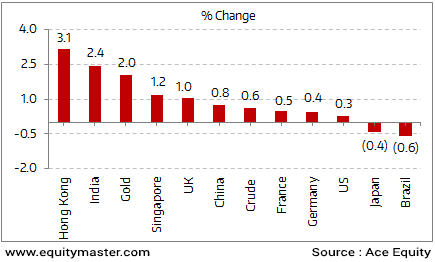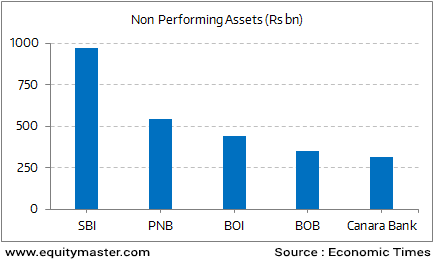The 'Pick and Shovel' Stock Picking Strategy to Beat Sensex 3x
- In this issue:
- » The strategy to beat Sensex returns by three times
- » Will this be a panacea to years of reckless lending?
- » Weekly Market Roundup
- » and more...

In 1848, JW Marshall found gold in California. As the word got out, people from all corners of the globe rushed to make money. It was the California gold rush. Three lakh people flocked to the state. A small settlement turned into a booming town. The state constitution was written. Schools, churches, and roads were built. The early gold seekers made money. The ones who were late had to be content with modest gains. Some even lost money.
But the interesting thing here is that, in the California gold rush, merchants made more money than miners.
Samuel Brannan, the first guy to get really rich from the rush, was not a miner. An enterprising retailer with a keen eye for profit, he foresaw the real opportunity...and it wasn't in mining for gold. Instead, he supplied the picks and shovels miners use to find gold. Over time, he cornered the mining equipment market. And emerged as one the biggest beneficiaries of the California gold rush.
Another gold rush merchant was Levi Strauss. Initially in the dry goods business, Levi Strauss responded to the gold-rush need for tough miner's clothes. He switched to denim and had it dyed in uniform indigo. Rivets were provided to keep pants in place. The new pants were cheap and lasted. And by the 1860s, Levi Strauss' blue pants were daily wear for miners and farmers and cattlemen throughout the West.
Even if you aren't aware of the history of the gold rush, we all are familiar with Levi's blue jeans.
Moral of these stories: Not all those who went west found gold. Strauss and Brannan made money nevertheless. Because they were able to identify the not-so-obvious opportunities and truly exploit the 'gold rush'.
The real challenge, then, is identifying these proxy plays in the early stage.
We may not come across something as eventful as gold rush today. But given the Indian demographic and consumption trends, there are enough opportunities to be capitalised.
Take tourism. With the rise of middle class and private airlines and e-travel platforms, domestic air travel has seen a boom this past decade. And so have the hotel bookings.
However, we wouldn't recommend betting on airline companies or traditional hotel companies, given their capital-intensive nature and bad industry economics. Those who have made these obvious bets have burnt their hands.
But it would be unfortunate to give up and let the trend pass without benefitting from it.
The Hidden Treasure team is focused on identifying companies that are less-known beneficiaries of such growing trends. Companies not only with great growth prospects, but robust balance sheets and attractive valuations.
Using this approach, the team has been able to beat benchmark indices three times and expects to maintain the record.
In fact, this month's Hidden Treasure recommendation is about a unique player in the hospitality industry. It's a direct beneficiary of the tailwinds from growing domestic tourism, rising discretionary consumption, urbanisation, and the growing middle-class population.
And with its asset-light business model, it's likely to avoid all the traps conventional airline companies and hotel businesses have fallen into. Click here to know more about this company...(Subscription required)
| --- Advertisement --- Less Than 12 Hours Remaining... Now you have Less Than 12 hours left to grab our Founder Member Offer for Apurva's SCOREFAST™ system. So hurry, or you could lose out on savings of Rs 150,050. There's also a 90-day refund policy on this offer, which means you've got absolutely no reason to hesitate. Click here for full details and sign up right away... ------------------------------ |
02:50 Chart of the Day
Rising to the menace of bad debts, the Reserve Bank of India is pondering over initiating tough measures against willful defaulters. Gross NPAs have risen at an alarming rate over the past 1 year. While RBI's proactive measure to tighten NPAs is proactive, banks need to take their share of blame. In our recent 5 min wrap up edition, we had highlighted how the banks return ratios had deteriorated due to its profits written off on account of NPA provisions.
Lack of homework done by the lending banks and reliance on the promoter hired investment brokers for due diligence has been one of the major reasons for the sharp rise in NPAs. Twenty-nine state-owned banks were allowed to write off a total of Rs. 1.14 trillion of bad debts between financial years 2013 and 2015. Due to this, the banks have very little incentive to put their house in order.
The RBI has done well to focus its attention on the willful defaulters. However, this seems to be a curative measure than a preventive one. Unless the root cause i.e. the initial lending process of banks is put in order, bad debt is likely to remain a cancer on economic growth.
Bad Loans Inventory Bloats Up
For investors betting on trading strategies, my colleague Apurva (Research Analyst), editor at Profit Hunter, has been working on and testing his latest trading strategy for nearly a year...
Over to him
- I have just finalised my new SCOREFASTTM trading strategy. I spent a lot of time discussing and analysing it. From the big ideas to the nuts and bolts. And thinking about whether it met [the] criteria for success. And I'm happy to report that its done that and more.
I have built my system after studying hundreds of stocks experiencing cyclical up and down trends. In our backtests, this system has generated 50%, 61%, 109% and even higher returns in a matter of just weeks to a few months.
The name, SCOREFASTTM, is an acronym for the nine indicators I use to identify stocks on the cusp of a long-term reversal. These indicators help us identify trading opportunities that could generate big returns in a few weeks to a few months...
The good news is Apurva has just launched a new trading service based on the proprietary SCOREFASTTM system.
Remember, you have only 12 hours left to grab our Founder Member Offer for Apurva's SCOREFASTTM system. So if you are interested to join us, click on this link right now!
Most of the global financial markets ended the week on a positive note. The US Fed raised rates for the second time in three months on Wednesday by 25 basis points to a range of 0.75% to 1%. The move to lift the target overnight interest rate was taken on the back of steady economic growth, strong job gains and confidence that inflation is rising to the Fed's target. The dollar remained under pressure for a third straight session. This is because the US Fed quashed hopes for a further bull run in the currency by keeping a gradual pace to its monetary tightening policy. The US markets were up 0.3% for the week gone by.
China also hiked rates on Thursday, while the UK and a European Central Bank policymaker hinted at higher rates. The People's Bank of China raised the rate for its six-month and one-year medium-term lending facility and open-market repurchase operations by 0.1%. The stock market in China was up by 0.8% for the week gone by.
The UK's main bluechip index, the FTSE 100, clocked up a new all-time high and increased 1% during the week. The main indices in France and Germany closed at their highest levels since mid-2015.
Back home, BJP's landslide victory in Uttar Pradesh, US Fed's less hawkish tone and an update on Goods and Services Tax (GST) pushed the Nifty 50 index to its fresh lifetime high. The BSE Sensex was up 2.4% for the week, while the NSE Nifty was up 2.5%. Midcap and Smallcap stocks outperformed the frontline indices to gain 4% and 3%, respectively.
On the sectoral indices front, realty, consumer durables and FMCG sector stocks led the gainers this week. On the other hand, stocks from telecom sector witnessed maximum selling pressure.

04:55 Weekend Investment Mantra
"If I was running $1 million today, or $10 million for that matter, I'd be fully invested. ... It's a huge structural advantage not to have a lot of money. ... The universe I can't play in has become more attractive than the universe I can play in. I have to look for elephants. It may be that the elephants are not as attractive as the mosquitoes. But that is the universe I must live in." - Warren Buffett
This edition of The 5 Minute WrapUp is authored by Richa Agarwal (Research Analyst).Today's Premium Edition.
Today being a Saturday, there is no Premium edition being published. But you can always read our most recent issue here...
Recent Articles
- All Good Things Come to an End... April 8, 2020
- Why your favourite e-letter won't reach you every week day.
- A Safe Stock to Lockdown Now April 2, 2020
- The market crashc has made strong, established brands attractive. Here's a stock to make the most of this opportunity...
- Sorry Warren Buffett, I'm Following This Man Instead of You in 2020 March 30, 2020
- This man warned of an impending market correction while everyone else was celebrating the renewed optimism in early 2020...
- China Had Its Brawn. It's Time for India's Brain March 23, 2020
- The post coronavirus economic boom won't be led by China.



Equitymaster requests your view! Post a comment on "The 'Pick and Shovel' Stock Picking Strategy to Beat Sensex 3x". Click here!
Comments are moderated by Equitymaster, in accordance with the Terms of Use, and may not appear
on this article until they have been reviewed and deemed appropriate for posting.
In the meantime, you may want to share this article with your friends!